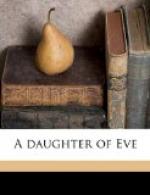Every one knows that French literature at that particular period was endeavoring to defend itself against an apathetic indifference (the result of the political drama) by producing works more or less Byronian, in which the only topics really discussed were conjugal delinquencies. Infringements of the marriage tie formed the staple of reviews, books, and dramas. This eternal subject grew more and more the fashion. The lover, that nightmare of husbands, was everywhere, except perhaps in homes, where, in point of fact, under the bourgeois regime, he was less seen than formerly. It is not when every one rushes to their window and cries “Thief!” and lights the streets, that robbers abound. It is true that during those years so fruitful of turmoil—urban, political, and moral—a few matrimonial catastrophes took place; but these were exceptional, and less observed than they would have been under the Restoration. Nevertheless, women talked a great deal together about books and the stage, then the two chief forms of poesy. The lover thus became one of their leading topics,—a being rare in point of act and much desired. The few affairs which were known gave rise to discussions, and these discussions were, as usually happens, carried on by immaculate women.
A fact worthy of remark is the aversion shown to such conversations by women who are enjoying some illicit happiness; they maintain before the eyes of the world a reserved, prudish, and even timid countenance; they seem to ask silence on the subject, or some condonation of their pleasure from society. When, on the contrary, a woman talks freely of such catastrophes, and seems to take pleasure in doing so, allowing herself to explain the emotions that justify the guilty parties, we may be sure that she herself is at the crossways of indecision, and does not know what road she might take.
During this winter, the Comtesse de Vandenesse heard the great voice of the social world roaring in her ears, and the wind of its stormy gusts blew round her. Her pretended friends, who maintained their reputations at the height of their rank and their positions, often produced in her presence the seductive idea of the lover; they cast into her soul certain ardent talk of love, the “mot d’enigme” which life propounds to woman, the grand passion, as Madame de Stael called it,—preaching by example. When the countess asked naively, in a small and select circle of these friends, what difference there was between a lover and a husband, all those who wished evil to Felix took care to reply in a way to pique her curiosity, or fire her imagination, or touch her heart, or interest her mind.
“Oh! my dear, we vegetate with a husband, but we live with a lover,” said her sister-in-law, the marquise.
“Marriage, my dear, is our purgatory; love is paradise,” said Lady Dudley.
“Don’t believe her,” cried Mademoiselle des Touches; “it is hell.”
“But a hell we like,” remarked Madame de Rochefide. “There is often more pleasure in suffering than in happiness; look at the martyrs!”




